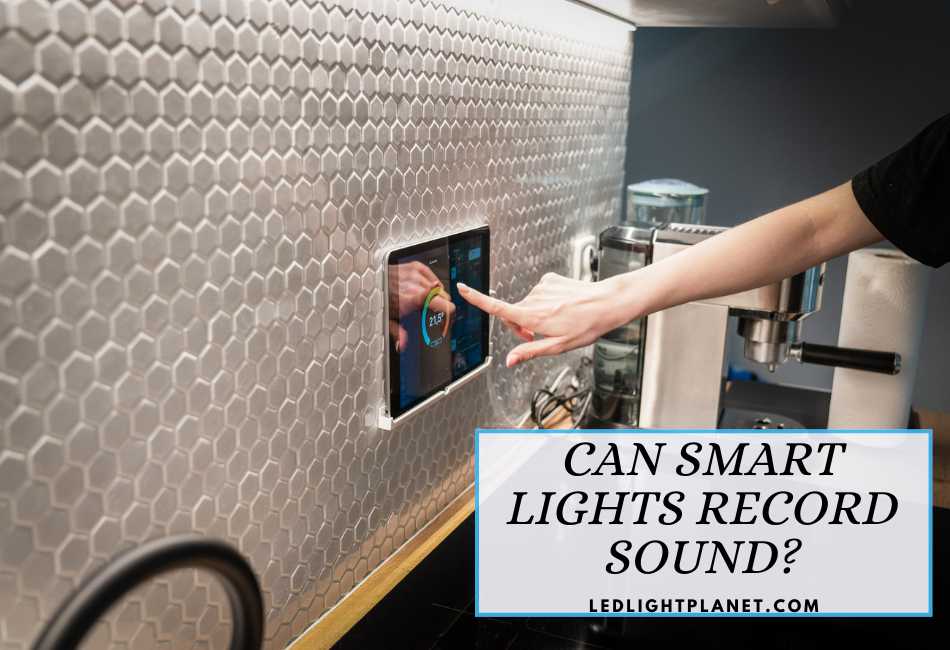In home automation and smart technology, smart lights have become popular due to their convenience, energy efficiency, and seamless integration with our digital lifestyles.
However, with the proliferation of these devices, there appears to be a cloud of misconception hovering around their capabilities – specifically, whether smart lights can record sound.
This misinformation likely stems from the broad landscape of smart devices, many of which do have audio recording features.
However, it’s crucial to set the record straight: Smart lights do not have the capability to record sound. They are designed to provide intelligent lighting solutions, not surveillance.
Anatomy of a Smart Bulb
Let’s delve into the fascinating world of smart bulbs, shall we? Here’s an insight into my personal experience with these nifty gadgets.
1. LED Lighting Array
Remember those good old days when we only had to decide between a 60 and 100-watt bulb? Well, things have evolved since then.
- Simple White Bulbs
My first encounter with smart lights was with the simple white bulbs. They’re your everyday bulbs but smarter.
You can dim or brighten them using your phone or a smart assistant, and they’re as energy-efficient as they come!
- White Ambiance Bulbs with Variable Shades
My second venture into smart lighting led me to the white ambiance bulbs.
These bulbs can change shades from cool to warm white, allowing me to set the room’s mood just right.
My favorite setting? A warm glow for those cozy winter nights!
- Full RGB Bulbs for Color Customization
Who doesn’t love a splash of color? These full RGB bulbs can switch to any color you fancy.
I found them perfect for parties or even creating a relaxed atmosphere with some soothing blues.
2. Power Management
One component that often goes unnoticed is the power management system, ensuring proper voltage flow.
It’s like the heart of the bulb, consistently pumping the required energy to keep things running smoothly.
3. Heat Sink
The heat sink is like the bulb’s personal little AC. It maintains an optimal temperature for the LEDs, ensuring they perform efficiently without overheating.
I recall the time when, during a particularly hot summer, all the traditional bulbs in my house were failing, but the smart bulbs remained unfazed.
4. Wireless Chip
- Connection to a Hub or Directly to a Phone
The wireless chip is like the brain of the smart bulb, allowing it to connect to a hub or directly to a mobile phone. This piece is what truly makes the bulb “smart.”
- Bluetooth Technology for Some Models
Some smart bulbs come with Bluetooth technology, letting you control them without needing a Wi-Fi connection. It was a blessing when my Wi-Fi was down one day, but I could still control the lights!
Lack of Sound-Recording Technology
Here’s the big reveal: Smart bulbs do not have microphones. They can’t record your conversations, your singing practice, or your arguments about who should do the dishes!
The primary role of smart bulbs is, quite simply, to provide light – but more intelligently. They allow for smart control, energy efficiency, and mood setting, but audio recording is not on their job description.
I’ve heard the rumors, too – tales of smart bulbs listening in on us. But trust me, they’re just that – rumors.
So, rest assured, my friends. Your smart bulbs aren’t tattletales. Your secrets are safe, at least from them!
Security Features of Smart Bulbs
Smart bulbs, at their core, are designed to illuminate and add convenience to our lives.
They work tirelessly to provide energy-efficient lighting and to respond to our commands, whether it’s dimming the lights for a movie night or turning off the lights when we’ve left the room.
My smart bulbs have become an integral part of my home automation system. They integrate seamlessly with my other smart devices, allowing me to create a comfortable and efficient living environment.
From coordinating with my smart thermostat to offering convenience with automated lighting schedules, my smart home’s sensors truly are the unsung heroes.
Manufacturers understand the significance of privacy in this digital age. They’ve built in security features and encryption methods to ensure that user data is protected.
Whenever I use my smart bulbs, I know that my data privacy is a top priority.
One of the features I appreciate most about smart bulbs is the control they give me over my data and privacy settings. I can choose what information is shared, reinforcing my trust in smart technology.
Addressing Bluetooth Connectivity
Many smart bulbs, including some I use, leverage Bluetooth technology for easier control and setup. This lets me operate my bulbs directly from my phone without relying on Wi-Fi.
Bluetooth connectivity has been a game-changer. I’ve found that it’s quicker, more reliable, and works even when my Wi-Fi doesn’t – like during that frustrating weekend when my internet provider let me down!
Despite the convenience, I was initially wary about Bluetooth and privacy issues. However, manufacturers have assured users that Bluetooth connections are secure and do not compromise data privacy. This has put my mind at ease.
Conclusion
We’ve covered a lot, from the primary roles of smart bulbs to their security features and the importance of user privacy.
We’ve talked about Bluetooth connectivity and how it doesn’t compromise privacy. We’ve also discussed how important it is to be informed and responsible smart device users.
Smart bulbs are designed to make our lives easier and more efficient. They’re not spies or eavesdroppers; they’re just very good at their jobs!
In the age of smart home devices, accurate information is our best tool. So, remember, while your smart bulbs might be smart, they’re not interested in your private conversations. They just want to light up your world!


